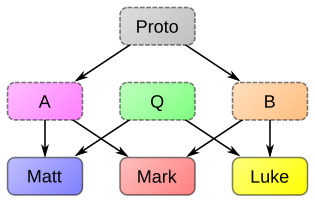Multi-source hypothesis
This article includes a list of general references, but it remains largely unverified because it lacks sufficient corresponding inline citations. (November 2013) |

The Multi-source hypothesis is a proposed solution to the synoptic problem, holding that Matthew, Mark, and Luke are not directly interdependent but have each drawn from a distinct combination of earlier documents. It encompasses a family of theories differing in the particulars of the nature and relationships of these earlier documents.
An early form of the theory was proposed by Marsh over two centuries ago.[1] More recently, Boismard proposed a structurally similar theory,[2] which was further developed by Rolland[3] and Burkett.[4]
According to these theories, the common material among the three synoptic gospels ultimately derives from a proto-gospel somewhat like Mark. This proto-gospel underwent two independent revisions, A and B. Mark was formed by recombining these two revisions. Matthew built upon A and Luke upon B. Both Matthew and Luke also drew from a common source Q, as well as other source sources for their unique material.
See also[]
References[]
- ^ Marsh 1823, pp. 167–409.
- ^ Boismard 1979, pp. 1–17.
- ^ Rolland 1984, p. 136 Rolland hypothesizes a proto-Matthew source originally composed in Hebrew
- ^ Burkett 2004, pp. 141–2 Burkett hypothesizes a proto-Mark source originally composed in Greek
Sources[]
- Boismard, Marie-Émile (1979). "The Two-Source Theory at an Impasse". New Testament Studies. 26: 1–17. doi:10.1017/s002868850000864x. (translated by Lorraine Caza, Robert Beck and Francis Martin)
- Burkett, Delbert (2004). Rethinking the Gospel Sources: From Proto-Mark to Mark. Continuum. ISBN 978-0-567-02550-0.
- Marsh, Herbert (1823) [1801]. "Dissertation on the Origin of our Three First Canonical Gospels". In Michaelis, John David (ed.). Introduction to the New Testament. vol. 3, pt. 2 (2 ed.). F. & C. Rivington. pp. 167–409. OCLC 9174154.
|volume=has extra text (help) - Rolland, Philippe (1984). Les Premiers Évangiles, un nouveau regard sur le problème synoptique (in French). Les Éditions du Cerf. ISBN 978-2-204-02118-0.
- Synoptic problem
- Hypotheses
- Bible stubs